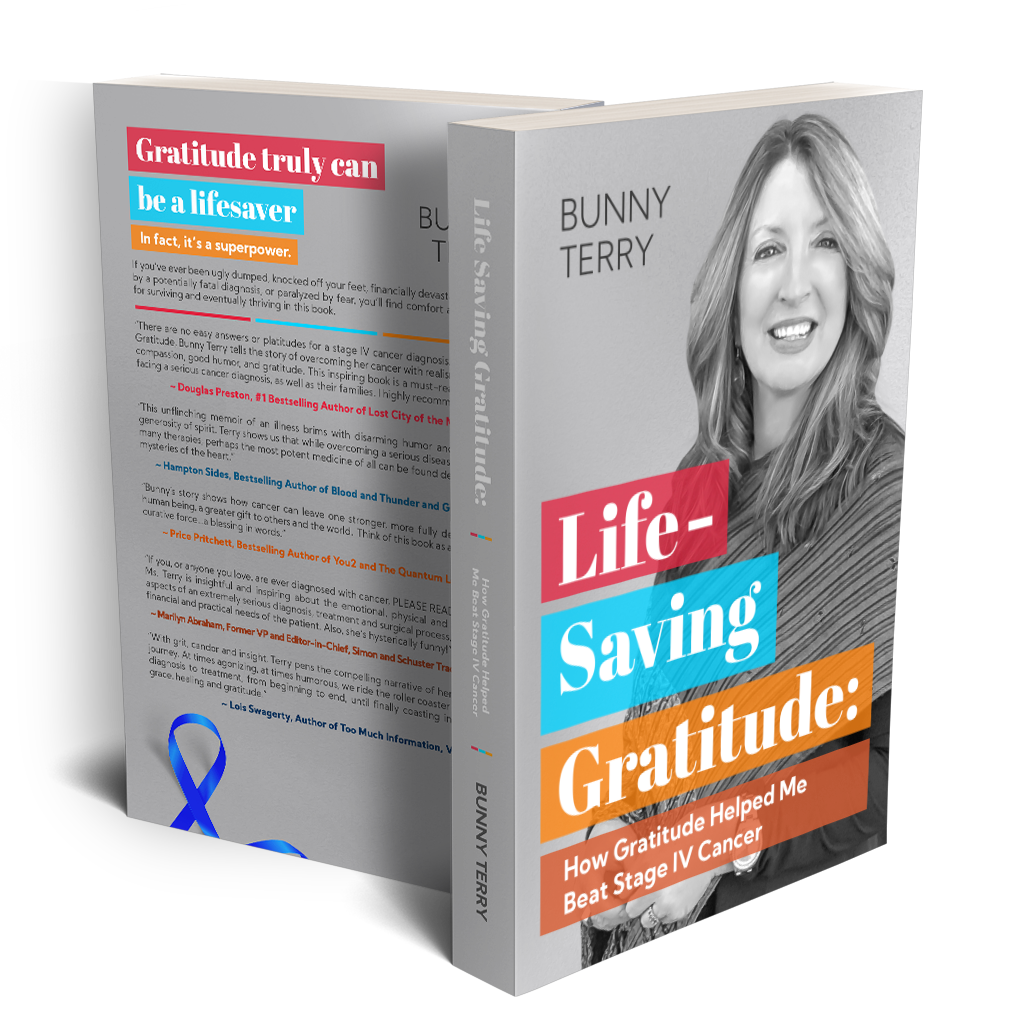About the Episode:
The Cancer Foundation for New Mexico is very special and dear to Bunny’s heart. As a cancer survivor and the Board Chair of the the Foundation, Bunny has a personal connection to the Foundation’s mission. She talks with Johanna Medina, patient services coordinator, about exactly what the Foundation does and how you can help further their mission to help cancer patients in Northern New Mexico.
Links
Cancer Foundation for New Mexico
2024 Sweetheart Auction
Sweetheart Auction Dream Vacation Raffle tickets
I Love New Mexico blog page
Bunny’s website
I Love New Mexico Instagram
I Love New Mexico Facebook
Original Music by: Kene Terry
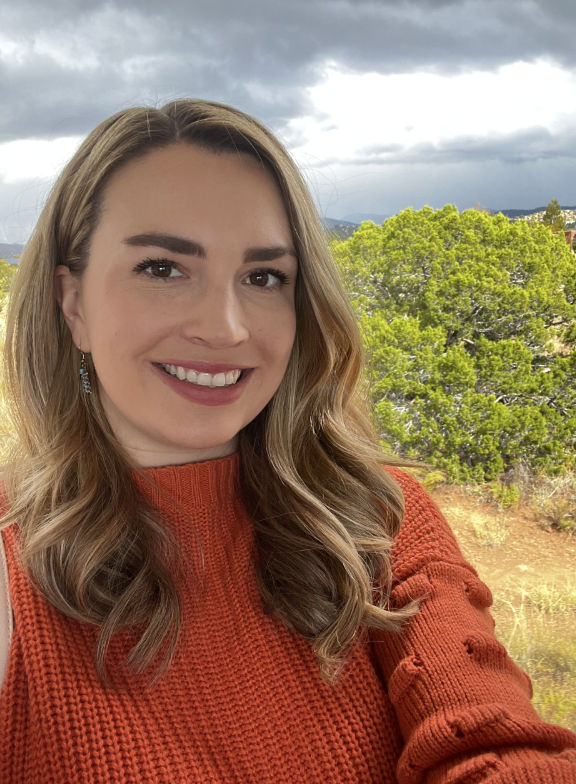
Featuring:
Johanna Medina
Johanna graduated with her Master’s in Social Work and MBA from New Mexico Highlands University. Johanna received her bachelor’s degree from the University of New Mexico. She has worked in New Mexico for the last seven years as a school social worker and medical social worker with the Department of Health. She has also been the caregiver for a stage IV cancer survivor. Johanna is a native New Mexican from Logan and has lived in Santa Fe since 2019. Johanna is excited to work with cancer patients and their families as a service coordinator as well as helping to coordinate the foundation’s volunteers.
Episode Transcript
Bunny : (00:00)
Hi there. I’m Bunny Terry, and you’re listening to the I Love New Mexico podcast. Whether you’re a native new Mexican, who’s lived here for your entire life, or you’re just considering a visit, this episode is for you. Join us as we share a lot of New Mexico stories, talk about all things New Mexico, and include topics like what’s magical here, where you ought to visit, what’s happening, and the things you absolutely cannot miss in the land of Enchantment. We’re excited that you’re here, and we can’t wait to show you what an amazing place New Mexico is, because let’s face it, I love New Mexico.
Bunny : (00:50)
Well, it’s a new year, and we have a, an interesting, and we hope informative and inspiring January for you. Um, one of the things that I, if, if you follow me anywhere else, and, and I know I’ve spoken of it here before, um, one of the things I’m proudest of and most dedicated to is, um, being part of the Cancer Foundation for New Mexico. This is an organization whose mission is to remove boundaries that, um, keep northern new Mexicans from getting to the cancer, the lifesaving cancer treatment, hopefully lifesaving, um, cancer treatment that they, um, need in Santa Fe. So, in the coming weeks, we will talk to some people who are actively involved in creating items for our annual SWEETHEART auction, which is on February 10th at the Santa Fe Convention Center. But first, we thought it’d be fun to have a conversation about the, the nuts and bolts of what the Cancer Foundation does and how the hands on help that we provide to cancer patients. And ironically, um, my producer and my daughter, Johanna Medina, is one of the social, she’s a social worker who works at the foundation. Tell people what your real, what your full title is. Johanna, and welcome to the show.
Johanna : (02:21)
Yeah. Hi. Thanks for having me,
Bunny : (03:32)
Well, um, Johanna, as you and I both know all too well from personal experience getting a cancer diagnosis, diagnosis is its own, um, terrible kind of devastation. But then if you also are worried about things like how you’re gonna feed your family or how you’re going to buy gas, um, it’s, it’s almost like those financial worries eclipse, um, really take away from the energy that you should be focusing on, um, getting well and taking care of yourself. And, um, you know, the history of the foundation is that 20 years ago, a group of doctors went to a group of philanthropists and said, we have people who are getting diagnosed and they go home and they never come back. And it’s not, we’ve done some research and discovered that it’s not because they don’t have some form of healthcare, either Medicaid, Medicare, um, maybe an employer provided, uh, even in the indigent system. I mean, people can get the care and the treatment, but they were not coming back because they couldn’t afford something as simple as a tank of gas to come from someplace like Mora or Trace Pires, those small towns in Northern New Mexico where, um, it’s, it’s really, really, um, cost prohibitive just to travel from there to Santa Fe, um, or to, if you have to make a choice between working and feeding your family and getting treatment, then, um, those, those are the hard, hard choices that they found our patients were having to make. I’m just, I, you know, I think it would help people who are listening if they could hear just a few, um, examples of the people that you help, um, who probably otherwise wouldn’t be getting the treatment that would help them get well.
Johanna : (05:40)
Yeah. Um, I think definitely talk a lot on this podcast. You talk about it and guests talk about how, you know, New Mexico is a very rural state, and there’s a lot of great things about it. And, and, you know, coming from a place that’s not so densely populated can be really great because you have space and you can see all this beautiful landscape. But one of the hard things is, is that you do have to travel
Bunny : (09:57)
Well, and, and the other thing that I don’t think people realize is I mean we’re talking to people from all over the world. I this is what our demographic shows on this podcast, and so, um, it’s expensive com com compared to the way many of our patients live. It’s expensive to come to Santa Fe and, um, you know, if you’re driving in, like you said, from Raton, it’s three hours. If you have a treatment that starts at eight o’clock in the morning, you’ve gotta get here and spend the night. And it’s expensive to spend the night in Santa Fe. So it’s a really big deal that we provide lodging, and that’s always been, um, one of the pieces that I you know, I’ve had treatment, I know how, um, debilitating it can be and how tired, um, I, it’s talk about that for a little bit because we give, I mean, we don’t, we don’t give people, um, money to spend on a room. We actually, you find them a place to stay, and then the foundation pays that expense, right? Mm-Hmm,
Johanna : (11:12)
Yes, a hundred percent. We don’t, you know, it’s not a voucher. It’s not, we pay half, we pay for the whole room. The patients don’t have to worry about it at all. So, something I didn’t know until I started working for the foundation, uh, was about how radiation treatment works, because you didn’t have radiation treatment. You know, I was your caregiver and obviously your daughter, and you had chemo, but when I started at the foundation, I found out that if somebody has to get radiation, it’s every day. So five days a week for as little as two weeks or, or up to 10 weeks. So that, you know, that’s five days a week for, for 10 weeks for, for over two months, or eight or eight weeks or six weeks, I’ve seen that full range. And so if they have to drive here every single day for five days, you know, essentially 50 days, um, that’s gonna add up even if you’re only coming from, you know, Espanola or Las Vegas an hour away. But imagine if you’re coming again from Taos, Raton, um, any of those areas that
Bunny : (13:38)
What Jock Soto said when, and we’ve had him on the podcast to talk about this before, but what, what he said was that it really, um, what we, what that part really helped him maintain his dignity. Dignity in the middle of what was not a very dignified experience for him. I mean, it was, um, that, that’s just the word that sticks in my mind from what he said before.
Johanna : (14:03)
Yeah, yeah. So, yeah, it’s, it, it doesn’t make, I think, and obviously I’m not going through it personally, but I think it helps patients to feel more comfortable. They get familiar with the hotel. Um, they try to, you know, the, the hotel works really well with them and making sure that most of our patients are on the first floor, so they don’t, if they have any issues with mobility, they don’t have to climb stairs. Um, they’re able to have someone stay with them, you know, and they, they have free breakfast, they provide a shuttle if patients need from the hotel to where they’re getting treatment, and of course just the double tree, they get cookies. Yeah.
Bunny : (15:42)
Yeah, that’s, um, right downtown, staying right downtown. That’s, um, we’re really grateful to those guys for offering that.
Johanna : (15:50)
Yeah. So that’s just, it’s such a relief. I know for patients to think I can just come, I can stay in that room. I don’t have to worry about driving. I can rest, which is of course, very important for your healing, and you have a meal provided. Um, we can also work with Kitchen Angels, which is a local organization, and they’ll deliver a nightly meal if a patient needs. So they’ll do that, um, um, every day of the week that the patient’s there. So we do pay for Monday through Thursday, which is, it’s never been an issue really, because patients want to go home for the weekend. So you have that, and then again, we’ll pay for that trip. So we’ll, we’ll provide the room, and then we’ll pay for your trip back and forth when you wanna go home for the weekend. And some patients don’t wanna stay, you know, that maybe they have pets or they just feel more comfortable being at home. And then again, we’ll just, we’ll pay for their, their gas, their trip back and forth for that.
Bunny : (16:48)
So, um, there is, just so people know, there is a financial component to this. So explain that to, to, to these services. To those services. I mean, there is, there are other services we offer that there’s not a financial component, but what, what is that?
Johanna : (17:03)
Yeah, so we are financially needs based. So you do have to apply, and it’s a very simple application, but we accept patients, um, to receive the, the gas reimbursement, the meal help, and the, and the lodging and the emergency fund. You do have to qualify at 300% the poverty line, which, um, you know, we’ve, it’s very, very rare that we have a patient apply that they’re over the limit or, you know, that’s, if you are at the point where you think you need to apply, you need the assistance, it’s pretty likely that you’re gonna qualify. If a patient is on Medicaid or Medicare, that’s a good indicator that you’re gonna qualify for our services. ’cause because they’re, um, they’re, uh, cutoff is even lower than ours. So that, and I mean, again, that changes every year. The poverty line changes based on inflation and all that kind of stuff.
Johanna : (17:59)
So if you think that you might qualify, it’s worth applying because, um, we’ve also had patients, you know, maybe they’re a few hundred over, or they, they were working last year, but they’re not working this year. So, um, they would still qualify. You know, we can work with people, um, based on their specific situation. So, and so the way that we verify that is we get some kind of, uh, proof of finances, which is usually like tax return. Um, most of our patients are on social security or they’re retired, so we just get like that social security letter. Um, typically if you’re on Social Security at all, you’ll, you’ll qualify because it’s not that much. No, it’s not. Unfortunately, people don’t make much at all on social Security. Um, and again, it can be hard. A lot of people don’t wanna share that information, but it’s, it’s very private. You know, we don’t, we don’t even share it with the rest of the foundation staff, really, it’s just the patient services coordinators and maybe the director that ever see what somebody’s finances are. Um, and patients are referred to us through their doctors, the nurses that do their chemo education, the other social workers that work, um, at the cancer center, if you hear about the foundation and you think, you know, you can, you can self-refer, as I always tell people, we, you could go to the website and, um, there’s applications on the website in English and Spanish. So, um, really any, any avenue in which you might hear about us, you can apply or, or be referred. So, and, and it’s another great thing that both of the cancer centers in Santa Fe, they work with, uh, Christus St. Vincent and Nexus Health, the staff there knows all about us, and they’re really good at knowing, okay, if a patient is traveling or they know that they’re struggling financially, they’ll refer them to the foundation, which is great, because otherwise we wouldn’t, wouldn’t know about them.
Bunny : (20:03)
And, um, I don’t wanna leave out the, the, um, support groups because that is, that’s not financially based anybody. Right. Um, and, and te tell me if I’m wrong, but even if you’re getting treatment elsewhere, I mean, can you become, can you get into the support groups? Because I know those are important to patients Yes. And their caregivers.
Johanna : (20:25)
Yes. That’s the, the great thing about the support groups is one, for one thing, you do not need to qualify by our financial standards to get into the support group. Another great thing is they are still, since Covid, they’re all virtual. So if you’re not in New Mexico, or if you, you know, you were, but you moved, um, you can, you can get in the support group. Our grief group is hybrid, so they meet half online, half in person, but all the other ones are completely virtual. So we have, um, a grief group, which is for, um, loved ones or caregivers that may have lost someone to cancer. We have the Together Group, which is for, um, caregivers and support. You don’t have to be, you know, a family member. It could be a friend. Uh, you don’t have to, sorry, you don’t have to be a direct caregiver. You could be, you know, just somebody who knows someone with cancer and it’s affecting you. That that’s a lot of people. And so that’s the Together Group. There’s the Living With Cancer Group, which is any patient at any stage, any at any point in the cancer journey, you can be in the, in the Living with Cancer Group. So you’re brand new to Cancer, uh, you just got diagnosed, or you are, you know, five years out from your diagnosis, you’re still in treatment, or maybe you’re not even in treatment anymore, but you’re still struggling with that. Um, we also have the Right To Heal Workshop, which is an eight week course, um, that Joanne Brown does throughout the year. And it’s, it’s different times of year. So you kind of have to check in on, um, the website and check in with her at when, when she’s doing that. I know she’s starting a new one, I think in January, and that one’s very popular. Um, the flyers on our website as well, and you, um, they’re the kind of groups other than the Right to Heal group. The support groups are something you can pop into for a few weeks. You can leave, you can come back. It’s not something that, you know, you have to attend every week. Um, I try to tell people that, because I think it makes it a lot more manageable if you think, okay, well maybe I wanna try this group out, but I’m not sure. It’s not that big of a commitment if you decide you don’t wanna stick with it, or if you, you know, go on a trip for a few weeks and you don’t wanna to, to attend the group every single week. Um, uh, yeah.
Bunny : (22:50)
And then the other thing that we provide, and, and, and I know we wanna get to talking about how people can help it, but we also have volunteers in the chemo suites.
Johanna : (23:00)
Mm-Hmm,
Bunny : (23:01)
Which is a big deal.
Johanna : (23:03)
Yes. So if anyone is in either of the chemo infusion rooms at Nexus or at Christus, and you see a volunteer there, usually they’re wearing, um, an apron that says Cancer Foundation for New Mexico. All of those, all of those volunteers are provided, well, not provided
Bunny : (25:01)
And the reason that we’re sharing this is that we really, we want everybody to know what the foundation does. We also want you to understand what you can do if you’re interested in helping. Um, we are going to put a link to the Cancer Foundation’s website. There is a button where you can donate. Um, we’re also going to put a link in there to the Sweetheart Auction, which we said was, as we said, it’s on February 10th. It is the largest charity event of its kind in New Mexico, and it accounts for almost 70% of our annual budget. And, and you can even, we’ll put a link in where you can buy a raffle ticket. Um, we are raffling, I, I believe this year we have six trips you can choose from or a cash price of $10,000. The tickets are only a hundred dollars, and that’s a huge part of our fundraising effort this time of year. So if you don’t have plans for, um, if you don’t have plans for, um, Valentine’s Day and you wanna do something fun, then um, please plan to attend the Sweetheart Auction on February 10th and check out the links here. The website is C-F-F-N-M for Cancer Foundation for New Mexico cf fnm.org. And I gotta tell you, this is an organization that makes a huge difference for a lot of people. And this is one place where if you donate, you can feel certain that all of your money stays in New Mexico, in Northern New Mexico, we don’t do research, we don’t do anything other than hands-on direct support to cancer patients from Northern New Mexico. Thanks so much for being here.
Bunny : (26:54)
Thanks to all of you for taking the time to listen to the I Love New Mexico podcast. If you’ve enjoyed this episode, please feel free to share it with your friends on social media or by texting or messaging or emailing them a copy of the podcast. If you have a New Mexico story that you’d like to share with us, don’t hesitate to reach out. Our email address is I love New Mexico blog@gmail.com, and we are always, always looking for interesting stories about New Mexico. Subscribe, share, and write a review so that we can continue to bring you these stories about the Land of Enchantment. Thank you so much.
About the Podcast
Recent Episodes
I Love New Mexico Teachers: Bunny Terry
About the Episode: Summer is coming to an end and a new school year is...
I Love New Mexico Food: Kirk Muncrief of AlbuKirky Seasonings
About the Episode: In New Mexico you know we love food AND we love spicy...
100th Episode Recap: Bunny & Johanna
About the Episode: The I Love New Mexico podcast has made it to 100...







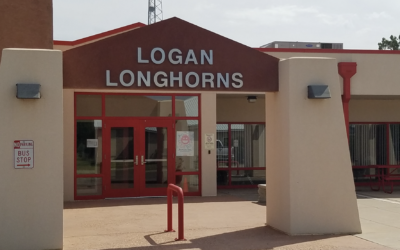
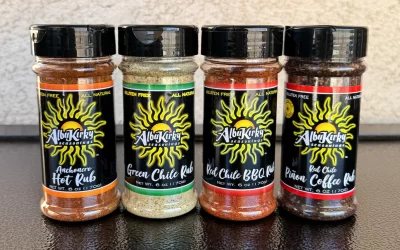
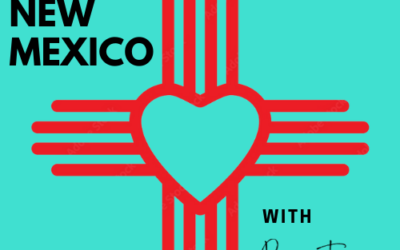
 Bunny Terry is a native New Mexican who grew up on a farm in northeastern New Mexico. Her first writing job was typing stories on index cards on her family’s Underwood, stories that were uncannily like the ones she read over and over in O Ye’ Jigs and Julips, her favorite childhood book. No one thought to save those index cards for posterity, although there is the theory sarcastically circulated by her siblings that they will certainly be worth millions someday.
Bunny Terry is a native New Mexican who grew up on a farm in northeastern New Mexico. Her first writing job was typing stories on index cards on her family’s Underwood, stories that were uncannily like the ones she read over and over in O Ye’ Jigs and Julips, her favorite childhood book. No one thought to save those index cards for posterity, although there is the theory sarcastically circulated by her siblings that they will certainly be worth millions someday. 